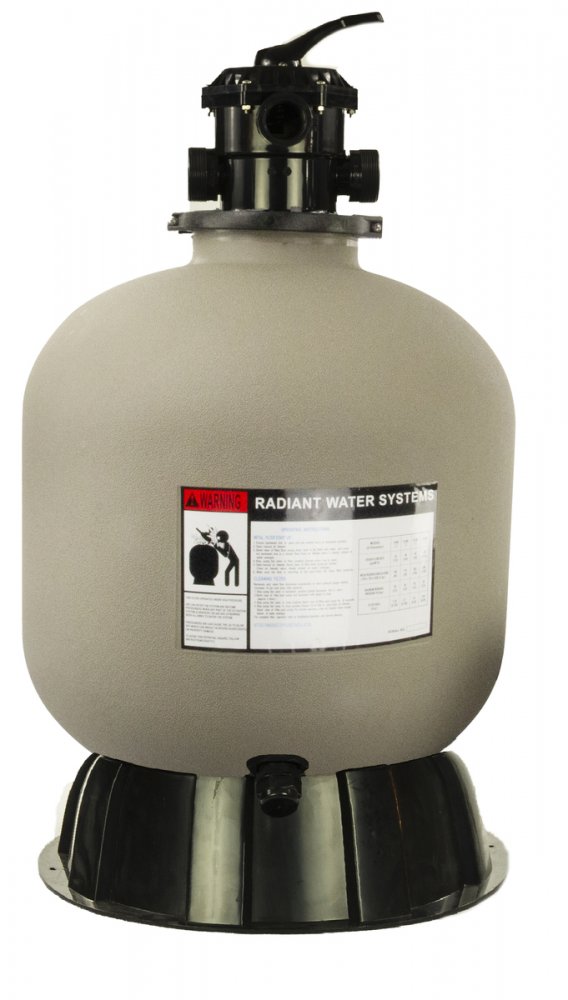As a pool owner you will want to maintain a clean pool; to do so you will have to find the correct filter for your pool. Swimming pool filters will be your best friend when it comes to getting rid of unwanted material that is floating around in your pool’s water. When shopping for filters you should be aware that there are three different types to consider: sand, cartridge, and diatomaceous earth.
Deciding what filter is best for you can be confusing since you don’t want to get too powerful or too weak of a filter for your pool’s size. We put together a swimming pool filter comparison guide that will help you see the similarities and differences of each filter. There isn’t a “bad” type of filter, but you will want to purchase a filter that suits your needs and is more efficient.
When considering how effective each type is there is a general rule to follow:
Sand: Good
Cartridge: Better
Diatomaceous Earth (DE): Best
DE and sand filters will require a valve to control the backwashing function. The two most common valves are the push-pull and the rotary valve. Regardless of type, the valve should always be kept in the filter position unless being used for another function.
The basic push-pull valve only has the ability to filter and backwash; rotary valves have a greater variety than the push-pull since it typically has six different positions:

Sand Filters use sand to collect the contaminants in your pool. They are large tanks that can hold between 50 and 300 pounds of sand. Sand filter push your pool’s water through the sand which will catch most of the contaminants in the water. The filter works best when it is slightly dirty; a clean filter can trap particles as low as fifty microns in size, and a slightly dirty filter can trap particles as low as twenty to twenty-five microns. Sand filters have the ability to last up to 10 years before the sand needs to be changed.
Pros:
Cons:
Cleaning Instructions:
Sand filters should be chemically cleaned as you are backwashing at least twice a year. Granular acidic crystals can be poured into the strainer basket and you will want to continue backwashing until all of the cleaners is out of the filter. It is important that you use gloves and goggles when you are adding chemicals. The backsplash of the granular acid can cause eye or skin damage.
Cartridge filters happen to be the filters of choice for hot tub/spas and many smaller above-ground pools. They contain a fan-folded polyester cartridge that can collect debris as low as 5 microns. Depending on the amount of use your cartridge gets, it should be replaced every 3-5 years. However, if the cartridge is undersized it may have to be replaced every 1-2 years. It is important to know that every time the cartridge is cleaned, it is going to lose some of its ability to collect debris. After cleaning, the cartridge can last up to 6 months before it needs to be cleaned again. However, in most cases, they will need to be cleaned on a more frequent basis.
Pros
Cons
Cleaning Instructions
Cartridge filters should be chemically cleaned at least twice a year. A great way to go about this is by placing them in a soak tank with a TSP (trisodium phosphate) or a similar solution. To make this process as easy as possible, you should have a replacement cartridge on hand to place in your filter tank while the other is being soaked in chemicals.
Pentair Easyclean™ De Filter System
DE filters require DE powder which is a white fossil powder that is coated on the filter tank’s grids to trap the contaminants in your pool. Mixing Diatomaceous Earth (DE) into a slurry of water will help it dissolve before adding it to your filter. If you create a slurry the solution won’t clot the grids. If the DE does clot, it will become less effective in catching the debris. This filter is the most efficient since it has the ability to trap particles as small as 3 microns.
Pros:
Cons
Cleaning Instructions
DE filters on pools that are open year-round need to be cleaned more, chemically clean the filter at least 4 times a year or 2 times every 3-6 months. There are two commonly used chemicals for cleaning this filter which are acid or detergent-based.
If you use chlorine or bromine for your pool then you should be using a detergent-based cleaner first. If this does not create results then use the acid-based cleaner. If you use biguanide in your swimming pool, you will want to use the acid-based cleaner first. As you remove the grids from the chemical baths, they then should be rinsed off with water.